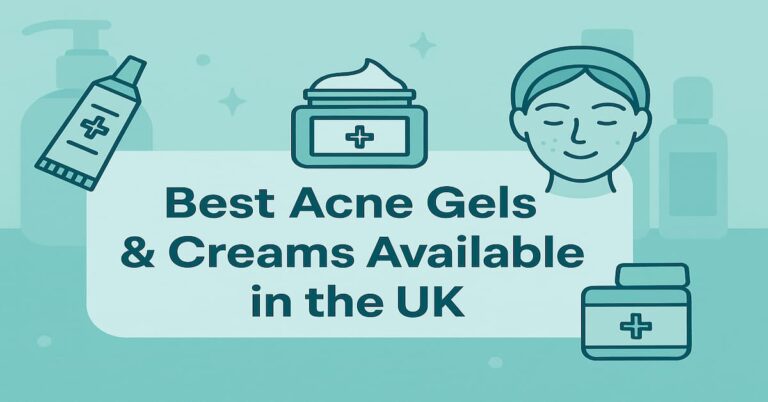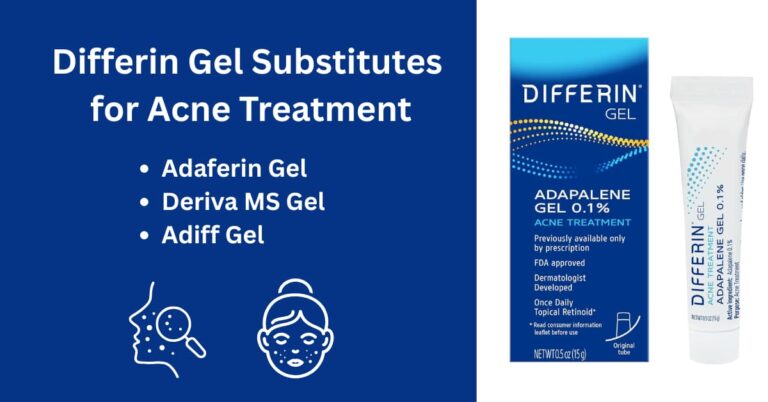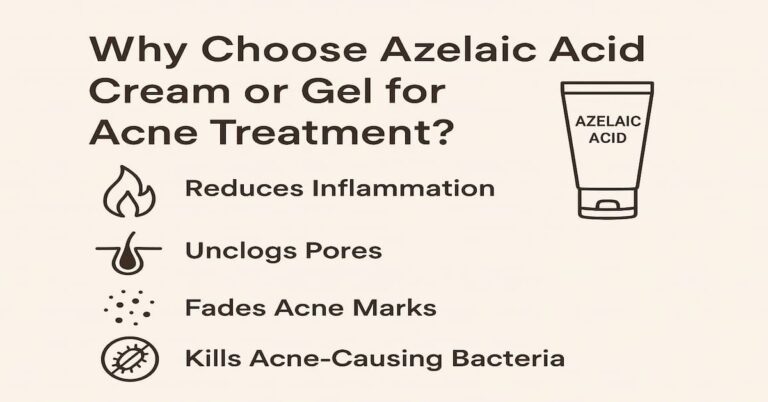Acne is a common skin condition that affects people of all ages, particularly teenagers and young adults. While prescription medications are available for severe acne, many non-prescription acne creams and gels provide effective relief without the need for a doctor’s visit. In the UK, there are numerous over-the-counter (OTC) acne treatments that target breakouts, reduce inflammation, and clear the skin. In this blog, we’ll explore the best non-prescription acne creams and gels, including popular options from India, to help you find the right one for your skin.
Understanding Acne and How Topical Gels and Creams Work
Acne occurs when hair follicles become clogged with excess oil, dead skin cells, and sometimes bacteria, leading to pimples, blackheads, and cysts. Acne creams and gels are designed to target acne-causing bacteria, reduce inflammation, and unclog pores. Ingredients like benzoyl peroxide, salicylic acid, and tea tree oil are commonly used to treat acne.
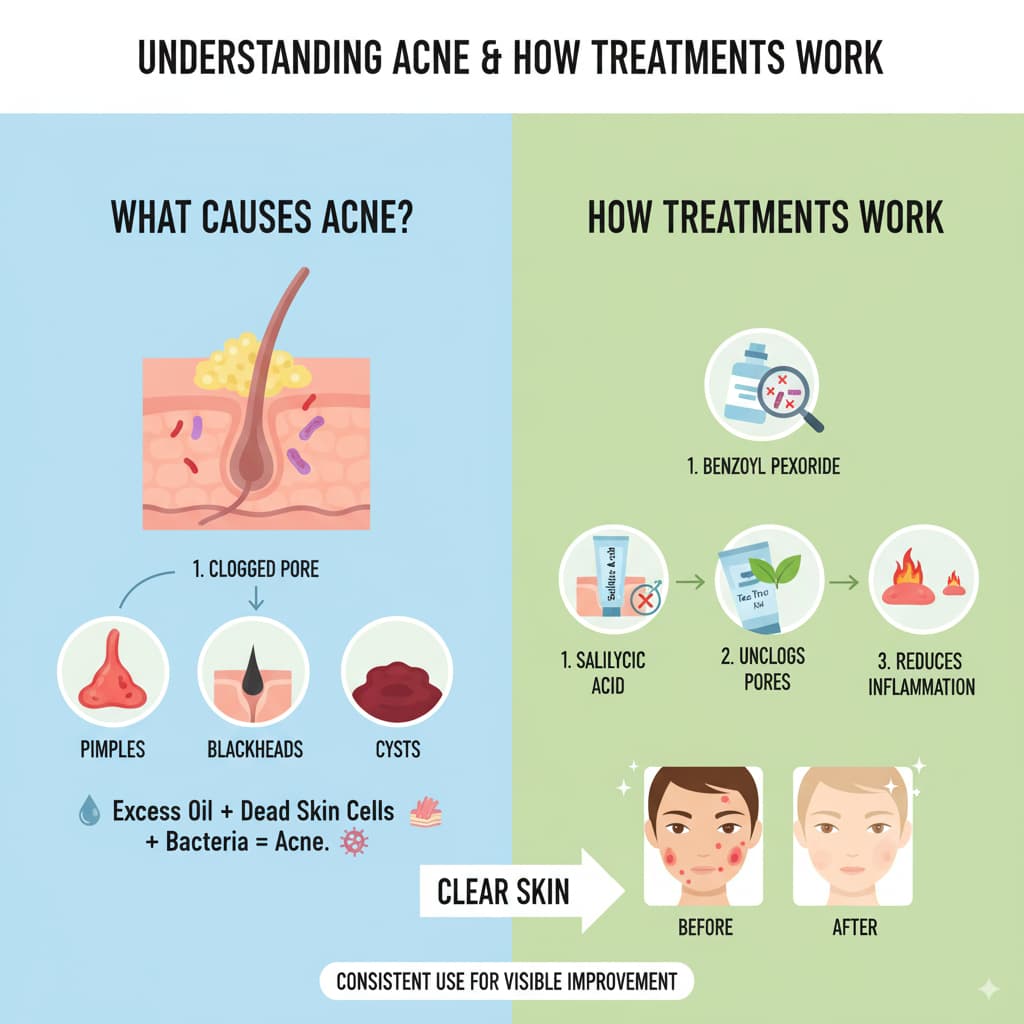
While OTC products may not be as potent as prescription medications, they are effective for mild to moderate acne and can help prevent future breakouts. These non-prescription treatments are perfect for those looking to manage their acne without a doctor’s visit.
Best Non-Prescription Acne Gels & Creams Available in the UK
1. Glyco 6 and Glyco 12 Creams
Glyco 6 and Glyco 12 are popular acne treatments available in the UK and are known for their exfoliating properties. These creams contain glycolic acid, which helps to exfoliate the skin, remove dead skin cells, and unclog pores. By increasing cell turnover, these creams help to reduce the appearance of acne scars and prevent new breakouts. Glyco 12 has a higher concentration of glycolic acid, making it suitable for those with more stubborn acne.
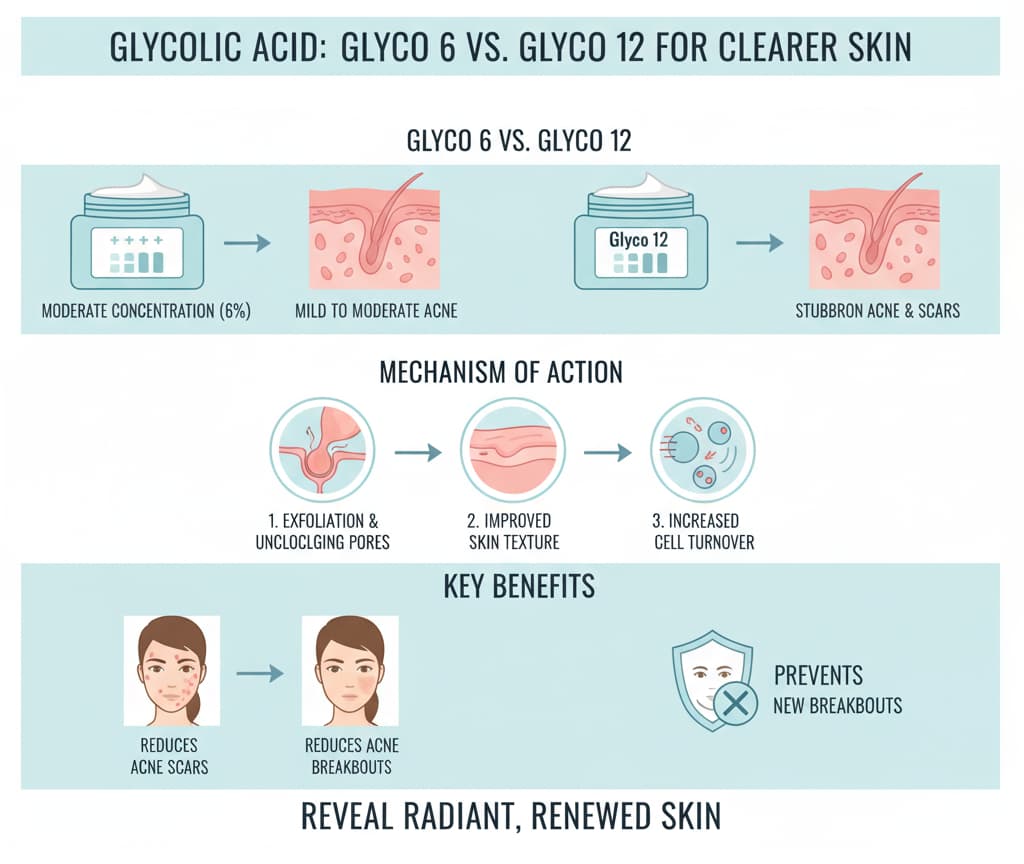
- Key Ingredients: Glycolic Acid
- Best For: Oily, acne-prone skin
- Benefits: Exfoliates the skin, unclogs pores, reduces acne scars
2. Himalaya Clarina Cream
Himalaya’s Clarina Cream is an Ayurvedic solution for acne that has gained popularity in the UK. It contains a blend of natural ingredients, including saffron and turmeric, which are known for their antibacterial and anti-inflammatory properties. This cream helps to reduce acne breakouts while soothing the skin and preventing new spots from forming. It is a great option for those with sensitive skin, as it is gentle yet effective.
- Key Ingredients: Saffron, Turmeric
- Best For: Sensitive, acne-prone skin
- Benefits: Reduces breakouts, prevents new acne, soothes irritated skin
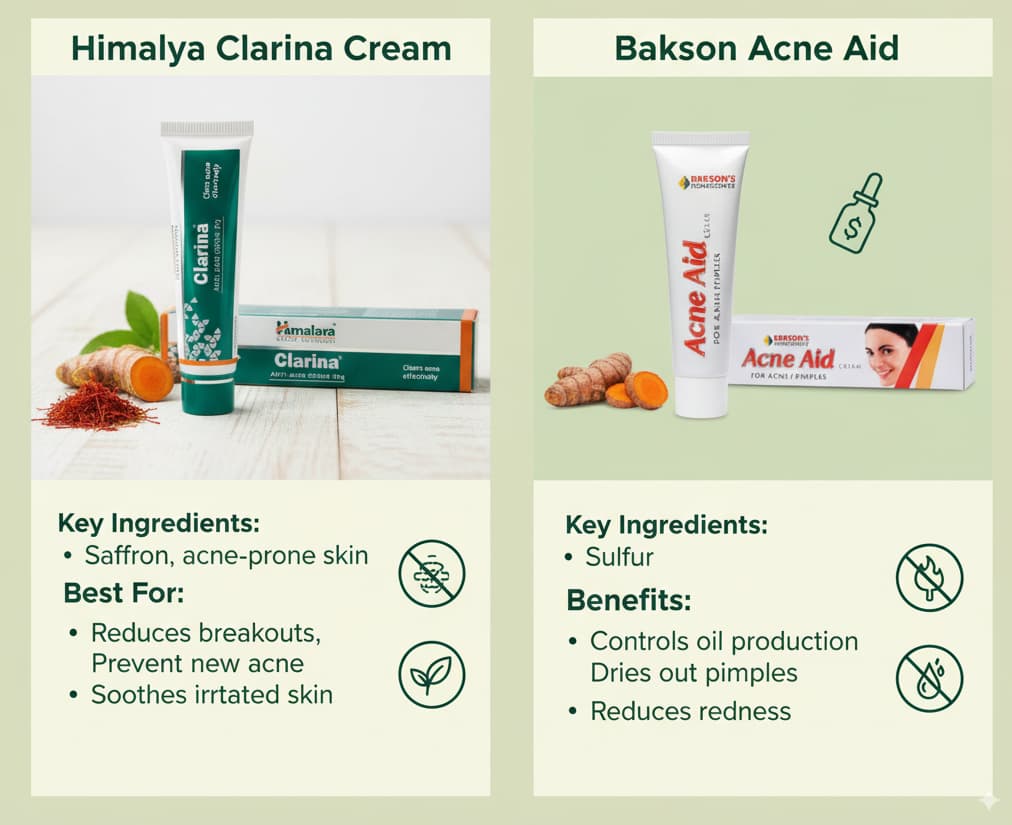
3. Bakson Acne Aid
Bakson Acne Aid is another popular acne cream available in the UK. It contains natural ingredients like sulfur, which helps to dry out pimples and control excess oil production. This cream is suitable for both oily and combination skin types and works well for those with moderate acne. It also has anti-inflammatory properties that can help calm redness and irritation associated with acne.
- Key Ingredients: Sulfur
- Best For: Oily, combination skin
- Benefits: Controls oil production, dries out pimples, reduces redness
4. Presol Forte Cream
Presol Forte is a non-prescription acne treatment cream containing benzoyl peroxide, a potent ingredient known for its ability to kill acne-causing bacteria. This cream helps to reduce acne inflammation and prevent future breakouts. It is particularly effective for inflammatory acne and can be used as a spot treatment or applied to the whole face for consistent results.
- Key Ingredients: Benzoyl Peroxide
- Best For: Inflammatory acne, oily skin
- Benefits: Kills acne bacteria, reduces inflammation, prevents breakouts
5. Bjain Omeo Acne Care Cream
Bjain Omeo Acne Care is an Indian homeopathic remedy that is becoming popular in the UK for acne treatment. It contains a combination of herbal ingredients designed to control acne breakouts, reduce inflammation, and prevent scarring. This cream is gentle on the skin and is suitable for those with sensitive skin who prefer a natural approach to acne care.
- Key Ingredients: Herbal Ingredients (Natural)
- Best For: Sensitive skin, mild acne
- Benefits: Controls acne, reduces inflammation, prevents scarring
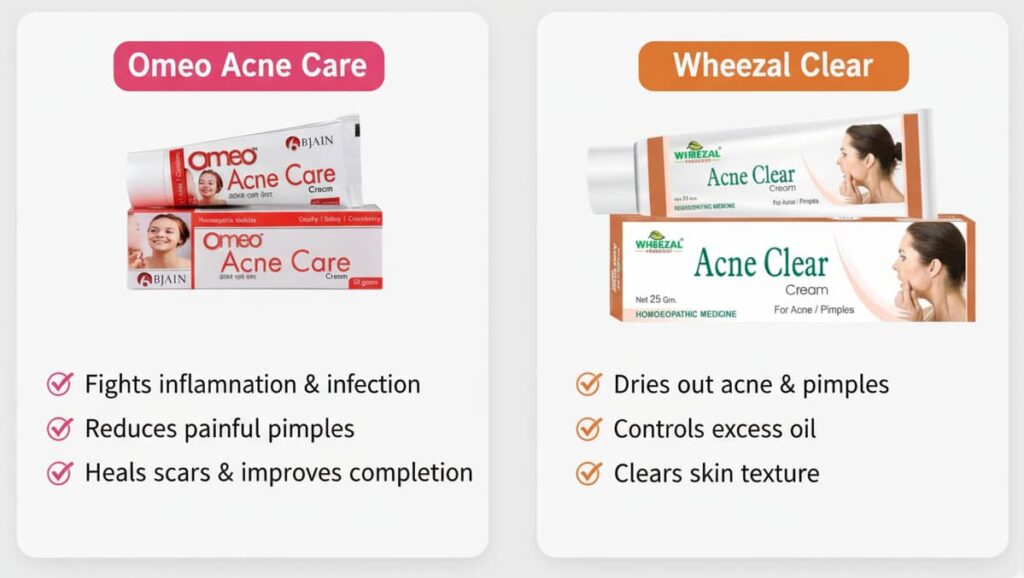
6. Wheezal Acne Clear Cream
Wheezal Acne Clear is another natural acne cream that is gaining popularity in the UK. It contains sulfur and tea tree oil, both of which are known for their antibacterial properties. This cream helps to reduce acne, clear existing blemishes, and prevent new ones from forming. Its natural ingredients make it a gentle treatment option for those with sensitive skin.
- Key Ingredients: Sulfur, Tea Tree Oil
- Best For: Acne-prone, sensitive skin
- Benefits: Fights acne bacteria, reduces existing acne, prevents future breakouts
7. Aziderm 10 and 20 Cream
Aziderm 10 and Aziderm 20 are creams that contain azelaic acid, an effective treatment for acne and pigmentation. Azelaic acid helps to reduce acne-causing bacteria, control oil production, and fade post-acne marks. These creams are suitable for mild to moderate acne and can be used daily to improve skin texture and reduce breakouts.
- Key Ingredients: Azelaic Acid
- Best For: Mild to moderate acne
- Benefits: Controls bacteria, reduces acne, fades post-acne pigmentation
Tips for Using Non-Prescription Acne Gels and Creams
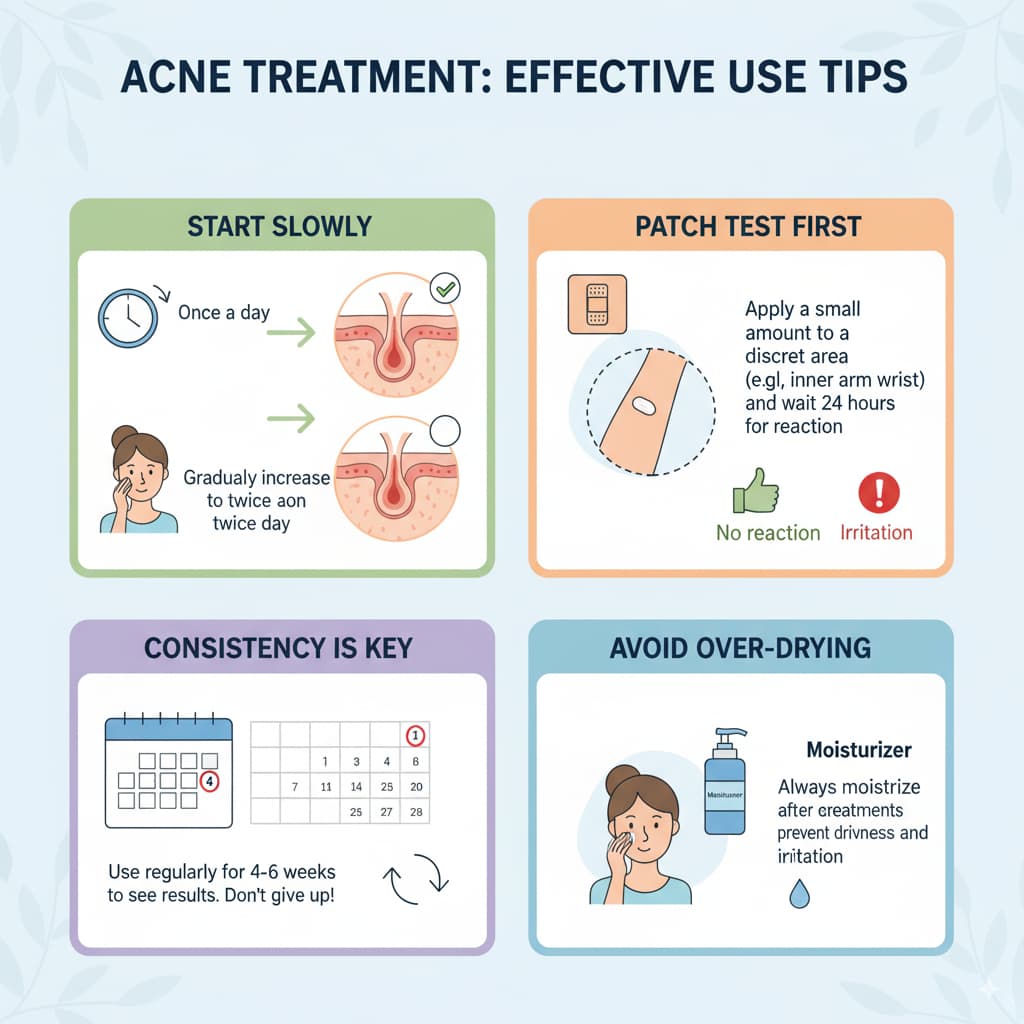
- Start Slowly: If you’re new to acne treatments, start by using the gel or cream once a day and gradually increase to twice a day as your skin builds tolerance.
- Patch Test First: Always do a patch test before applying any new product to your face, especially if you have sensitive skin.
- Consistency Is Key: Acne treatments take time. Stick to a routine and give your product at least 4-6 weeks before deciding whether it’s effective.
- Avoid Over-Drying: Acne treatments, particularly those with benzoyl peroxide or salicylic acid, can dry out the skin. Follow up with a good moisturizer to prevent dryness and irritation.
FAQ: 10 Frequently Asked Questions
Can acne creams help with scarring?
Certain acne creams, especially those containing glycolic acid or azelaic acid, can help reduce acne scars over time by exfoliating the skin and promoting cell turnover. These creams help fade post-acne marks and improve skin texture, leading to a more even complexion.
How do non-prescription acne creams work?
Non-prescription acne creams typically contain active ingredients like benzoyl peroxide, salicylic acid, or glycolic acid. These ingredients help exfoliate the skin, unclog pores, reduce inflammation, and fight acne-causing bacteria, ultimately helping to reduce breakouts and improve skin texture.
How long does it take for acne creams to work?
It can take anywhere from 4 to 6 weeks of consistent use before you start seeing significant improvements. Acne treatments need time to penetrate the skin, unclog pores, and reduce inflammation, so patience is important during the treatment process.
Can I use acne creams for sensitive skin?
Yes, many acne creams are formulated for sensitive skin, often containing natural ingredients like turmeric, aloe vera, or chamomile. However, it’s always best to patch test a product before applying it to your entire face to ensure it won’t cause irritation.
How often should I apply acne cream?
For best results, start by applying acne cream once a day and gradually increase to twice a day as your skin builds tolerance. For severe acne, you can use the cream more frequently, but always follow the product’s usage instructions to avoid irritation.
Can acne creams cause dryness?
Yes, some acne creams, particularly those with ingredients like benzoyl peroxide or salicylic acid, can dry out the skin. To prevent this, use a gentle moisturizer after applying acne cream to keep your skin hydrated and avoid over-drying.
Are acne creams effective for blackheads and whiteheads?
Yes, acne creams that contain salicylic acid or glycolic acid are especially effective for treating blackheads and whiteheads. These ingredients exfoliate the skin and help unclog pores, which can prevent the formation of these types of blemishes.
Should I use acne cream during the day or night?
Many acne creams can be used both during the day and night, but if the product contains benzoyl peroxide, it’s usually best to apply it at night to avoid sun sensitivity. Always remember to use sunscreen during the day to protect your skin from UV damage.
Can I use multiple acne creams together?
While it is possible to use multiple acne treatments, it’s important not to overdo it. Using too many products with strong active ingredients can irritate the skin. It’s best to use a combination of products that complement each other and to focus on consistency rather than overloading your routine.
Can acne creams cause breakouts initially?
Some acne creams may cause an initial flare-up, known as “purging,” where your skin may break out more in the beginning. This is a normal part of the process as the cream starts to bring impurities to the surface. After a few weeks, this should subside, and your skin will improve.
Conclusion
Non-prescription acne gels and creams available in the UK, including popular OTC products from India, are a great way to manage and treat acne without the need for a doctor’s visit. From natural remedies to more potent treatments like benzoyl peroxide and salicylic acid, these products can effectively reduce breakouts, control oil production, and promote clearer skin. Remember to be patient with your treatment, as acne takes time to improve, but with consistency, you can achieve a clearer complexion.
